Libre, non Gratis: BerLon
October 2002: in the midst of the crash and burn of the corporate Internet infrastructure paradigm, wireless free-network groups from across Europe converged on Berlin to share their experiences and make plans for the future. Over several days of meetings a document was fashioned - the Pico Peering Agreement
By the end of the event, the initial name of the wireless exchange event "BerLon" looked like it needed extending to accommodate another half dozen European cities represented, something unpronounceable like BerLon/Mad/Sev/Cop/Rom/Pra.
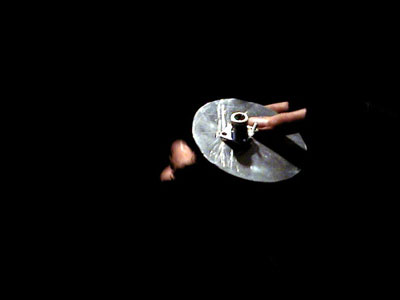
As well as the international free-networkers, over fifty individuals from Berlin turned up and took a very active role in the event. Many of the Berliners represented local groups who were in the process of setting up their own local wireless networks. The experiences of these local free-networkers ranged from a housing co-op that wanted to connect its different buildings, to the charred remains of a dot com whose surviving members were turning their computer hardware over to more socially benevolent ends by setting up wireless community networks.
The structure of the BerLon event was a combination of presentations which later split into working groups, following either discussion led activities such as the PicoPeering network agreement or practical workshops like wireless antenna building with Dr.Blinov.
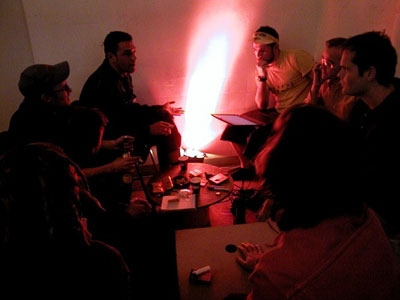
Consume and other free-network groups based in London have been organising and running events structured along the lines of BerLon since spring 2001 and out of this experience has grown what are now called the Consume Clinics, which run once a month in an old town hall in East London. As the name 'clinic' suggests, there is an element of administered therapy at these meetings, usually of the technical variety.
The clinic model was just as valuable for the various Berlin free-networkers who came to the BerLon event. Like many others world-wide, they had caught the free-networks meme through the Internet, now they needed technical help with that last ten percent, to complete their wireless node, and a social event like BerLon to help them find potential local collaborators.. The social element of these clinics highlights a common condition of wireless free-networks: the technical limitations of the wireless technology are also a benefit. The line of sight locality of wireless might limit the distance between nodes, but it means that in order to build a larger network, you have to get to know your neighbours. This encourages the development of an additional, social network. It is in this context that the Consume Clinic methods of collaboration, research sharing, and decentralised organisation have evolved.
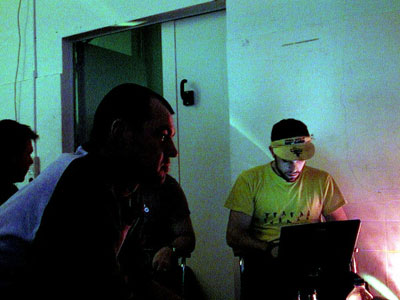
The free-network movement is world-wide in its scope, and although the movement is built by many, decentralised groups, they are affiliated through web sites like <http://freenetworks.org> where people share news and ideas about the network's development. The free-networks movement sits within a pre-Internet history of public access media movements, for example the NY-based Paper Tiger TV, started in the 80s, or the free radio movement in France in the 60s and 70s.
Free-networks are created by those who use them, rather than being brought to consumers by corporations. It is not necessarily gratis as in cost, but libre, as in ensuring specific freedoms. Each participant in the network owns and manages their own node or network infrastructure (wired or wireless), and each participant is responsible for what the node's role in the network is to be.
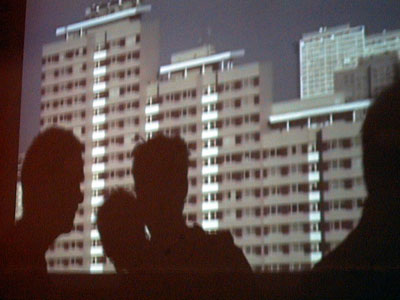
At the BerLon event the free-networkers worked on an ambitious agreement meant to be adopted and adapted by free-networks world wide, This 'PicoPeering agreement' seeks to protect the free-network's autonomy and ensure the basic freedom of zero cost, unimpeded network transit, keeping the network technically functional without restricting both commercial and non-commercial uses.
The PicoPeering agreement aims to protect the free-network movement from appropriation by commercial, competative pressures, learning from the history of the French free radio movement that was undermined when president Mitterand (who was involved in free radio) legalised it: the successful stations were clandestinely privatised and the unsuccessful ones were abandoned by their voluntary work force [1].
The PicoPeering agreement boiled down to one key freedom; that of transit (of network traffic) across the free-network nodes that adopt the agreement. If the transfer of information across the network is not territorialized by hierarchical, pay-per-packet structures, no one section of the network can co-opt or control the flow of that information. With this agreement in place, commercial sections of network would still have to keep to this transit agreement to maintain communication with the rest of the free network.
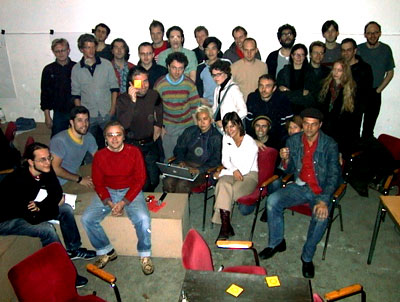
A mixture of commercial and non-commercial networks already exist in many free-network movements: community groups like the Consume project, "a collaborative strategy for the self provision of a broadband telecommunications infrastructure" sitting alongside other groups such as Wlan, a small scale commercial wireless network based in Berlin. The PicoPeering agreement stresses the need *not* to curtail the freedoms of those wanting to take part in the free-networks: commercial activity can take place within the free-networks model as long as transit is kept free. In the end this benefits all parties; as the network grows, it becomes an increasingly useful altermative to using Internet transit (which costs money, and is non-free).
In June 2002, the Dutch data network KPNQwest went into liquidation. Their routers were shut down, dumping half of Europe's Internet traffic down a black hole. As more Internet mega-corps implode, the alternative of a distributed free-network seems a more sustainable model than a system built on the economics of Enron-style hollow deals.
Pictures http://bootlab.org/BerLon/photos/
Logo artwork BerLon: http://dek.spc.org/BerLon/BerLon2.gif
Links http://www.raylab.com/antenna (Antenna Building Workshop) http://free2air.org/ (Mapping Workshop) http://www.picopeer.net/ (Picopeer Agreement Workshop ) http://consume.net/twiki/bin/view/Main/BerLon (Organisational Page) http://youarehere.metamute.com (Community Wireless Networking) http://www.heise.de/newsticker/data/jk-13.10.02-005/ (local copy ) http://www.heise.de/ct/02/22/052/ (local copy) http://matrix.orf.at/bkissue/021110_1.htm (local copy)
Lists consume-thenet@lists.consume.net picopeer@picopeer.net
Acknowledgements A big thanks to Armin Medosch for co-ordinating the BerLon event. The BerLon event was kindly supported by Heinrich Boell Stiftung, W:Lab and bootlab, in sync with Urban Drift 2002, where representatives of London and Berlin based FreeNetworkers and thinkers discussed the development of FreeNetworks.
Text collated from various freenetwork sources Simon Worthington -simon@metamute.com Co-editor/founder of Mute magazine - culture and politics after the net - http://www.metamute.com December 2002 | Copy left --
Diagram of commercial network model alongside freenetwork model
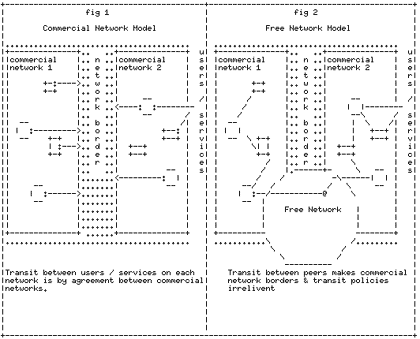
Footnotes [1] Media Freedom: the contradictions of communications in the age of modernity (Pluto Press, London 1995, ISBN: 0745309437) Richard Barbrook <http://www.hrc.wmin.ac.uk/hrc/about/staff/staff.barbrook>
Mute Books Orders
For Mute Books distribution contact Anagram Books
contact@anagrambooks.com
For online purchases visit anagrambooks.com






